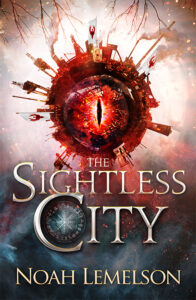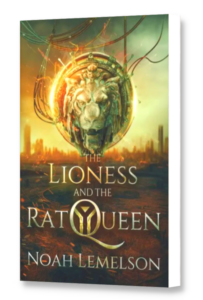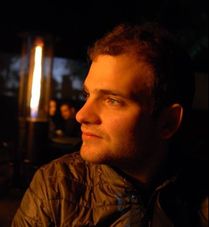 Los Angeles, CA – After winning a First Place award in the OZMA Book Awards for Fantasy Fiction for his debut dieselpunk fantasy, “The Sightless City,” (July 20, 2021, Tiny Fox Press), Noah Lemelson is back with the newest, gripping continuation of his steampunk-apocalyptic-noir trilogy, “The Lioness and the Rat Queen” (August 29, 2023, Tiny Fox Press).
Los Angeles, CA – After winning a First Place award in the OZMA Book Awards for Fantasy Fiction for his debut dieselpunk fantasy, “The Sightless City,” (July 20, 2021, Tiny Fox Press), Noah Lemelson is back with the newest, gripping continuation of his steampunk-apocalyptic-noir trilogy, “The Lioness and the Rat Queen” (August 29, 2023, Tiny Fox Press).
 “Sure to entertain any fan of gritty speculative fiction.”
“Sure to entertain any fan of gritty speculative fiction.”
– Publishers Weekly
A city burning, a murderous tycoon on the run, and three vigilantes out for revenge…
Marcel never thought his investigations would lead to this; his once-friend Lazarus Roache turned slaver and cruel puppet master. For the good of Huile, and to salve his conscience, Marcel must take Roache down, even if that means following him into the desolate and savage reaches of the Wastes.
Yet when winds of the Wastes grind their hopes of justice to dust, the three must make common cause with the hardened “Lioness of Vastium,” a disgraced Principate General who wants Marcel’s head just as much as Roache’s. To survive and take down the tycoon, they must find a way to fight as one–but blood begets blood, and old vendettas cannot stay long buried in the blasted soil of the Wastes.
“The Lioness and the Rat Queen”
Noah Lemelson | August 29, 2023
Tiny Fox Press | Steampunk/Dieselpunk Fantasy
Hardcover | 2370001-690943 | $29.99
Paperback | 978-1946501-53-0 | $17.99
Praise for
The Sightless City
“A gripping mystery with an exceptionally fleshed-out world.”
-Kirkus Reviews
“Take one step into The Sightless City and you’re pulled into a crackling adventure of intrigue, danger and mystery until the very last page. Lemelson builds an intricate steampunk fantasy world and sets it ablaze with haunting characters and deep moral questions. It’s a thrilling debut!”
-Amanda Silver, writer and producer of Rise of the Planet of the Apes and Jurassic World
“Lemelson melds industrial revolution with powerful magic; and, like all revolutions, this one isn’t a tea party.”
— Dave Higgins, author of Seven Stones: The Complete Series
“Stellar worldbuilding and quick pacing. This is sure to entertain any fan of gritty speculative fiction.”
-Publishers Weekly
“With one foot in the seemingly magical and the other in SF, The Sightless City hits that same sweet spot that Tamsyn Muir mines so successfully in Gideon the Ninth. Lemelson revives and updates the gestures of science fantasy to make it a truly 21st century form. Funny, dark, irreverent, and endlessly entertaining, The Sightless City is a rustpunk wonder and a first-rate debut.”
— Brian Evanson, award-winning author of Song for the Unraveling of the World and The Warren
“Feast your eyes on Sightless City, a world no one had ever seen until Noah Lemelson transported us to his exotic crossroad of fantasy, dieselpunk, and sci-fi. It’s a book for all ages: past, present, and future. At the same time. Venture inside and this new author will be a part of your future.”
— Gary Goldman, screenwriter of Big Trouble In Little China, Total Recall, Navy Seals
Reviews from Readers
“Noah is an incredible writer. He has done what most sci-fi writers cannot. He wrote a believable sci-fi/fantasy/steampunk/thriller.”
— Anne Hart, Instagram Influencer
“Big fat 5 stars for this book and a massive congratulations to Noah Lemelson for writing an exquisite debut novel.”
— Melina’s Blog, blogger
“A longer read and I finished in just 2 short days.”
— Lost in a Book Erin, Instagram Influencer
“Five stars for this fast-moving, fascinating steampunk/fantasy/mystery adventure! The world building was nearly flawless.”
— Ellen Z Reads, Instagram Influencer
“…Fascinating and engaging read! Don’t miss it!”
— Goodreads reviewer
 Noah Lemelson is a short story writer and novelist who lives in LA with his wife and cat. Lover of Science Fiction, Fantasy, New Weird, and Punk. He received his BA in Biology from the University of Chicago in 2014 and received his MFA in Creative Writing from the California Institute of the Arts in 2020. He has had several of his short stories published in both print and online magazines, such as Allegory, Space Squid and the Outsider’s Within Horror Anthology.
Noah Lemelson is a short story writer and novelist who lives in LA with his wife and cat. Lover of Science Fiction, Fantasy, New Weird, and Punk. He received his BA in Biology from the University of Chicago in 2014 and received his MFA in Creative Writing from the California Institute of the Arts in 2020. He has had several of his short stories published in both print and online magazines, such as Allegory, Space Squid and the Outsider’s Within Horror Anthology.
Follow Noah Lemelson on social media:
Facebook: @Noah Lemelson | Instagram: @EruditeGoblin
In an interview, Noah Lemelson can discuss:
- How one’s own flaws allows for deception and control
- The nature of evil, ideological evil vs. pure selfishness
- His unique approach to fantasy with realistic and flawed characters
- How and why he merged the genres he chose
- What’s to come in the world of Huile for the last two installments of his trilogy
An Interview with
Noah Lemelson
1. How did you write the evolution of the story you began in The Sightless City? What inspired the continuation of your characters’ journey?
The story started as one big book, before being split into a trilogy, so I always knew where they were headed. My first vision for this story was these four characters, around a campfire, hunting a single man. A big part of the The Sightless City was setting up our “heroes” (I use the term loosely), explaining their relationship to Lazarus Roache, and laying the groundworks for this haphazard quest for revenge, so it’s fun to finally get to see them making their way (mishaps and all) through the Wastes. On a character level, I was excited to explore Sylvaine’s struggles with her powers, and the possibility of losing them, as well as Marcel wrestling with the moral implications of his past actions, particularly when faced with the titular Lioness and The Rat Queen.
2. How can fiction alter one’s own self narrative?
I think fiction allows us to look at the world through someone else’s eyes, and that’s a skill that can be turned inward. Different perspectives let us realize that the way we think about anything, including ourselves, is just one possibility, not the be-all-end-all truth. We all live in our own stories, partially written by us, partially written by others, while we can’t always control the way we fit into other peoples’ narratives, I think we do have some control on how we tell our own story. Fiction lets us practice that skill.
3. How did you decide to set your story in a steampunk fantasy world against the tumultuous backdrop of a partial apocalypse?
For whatever reason, I find industrial decay to be utterly fascinating, and even beautiful in its own way. I think that’s one reason why places like Chernobyl are so fascinating, places marked by civilization but no longer controlled by it. Traditional fantasy loves its ruined temples and forgotten cities, I think it’s interesting to take those same tropes and bump them up a couple centuries.
4. Could you explain your “realistic” approach to writing magical characters?
Though the term magic is never used in the book (besides once in a derisive aside), several characters have abilities or powers that are… basically magic with a fancy name. It’s a fun fantasy to imagine problems that magic could solve, but I think it’s often more interesting to look at what magic can’t solve. Self-doubt, moral quandaries, societal inequalities, relationship difficulties, magic has its limit. Its like anything else, skills or powers in one part of life don’t necessarily translate to others, and I think many of the most interesting stories about magic characters, be they literal wizards, super-heroes, or realty-defying inventors, is to look at where their magic is no longer enough.
5. What exactly is the Calamity, and how did that event influence the ongoing wars and discrimination throughout the book?
The details of the Calamity aren’t discussed much in the book, but in short it was a massive disaster caused by the misuse of ætheric weaponry that turned a big chunk of the continent into desolate Wastes. It’s one of those events that is so big that it paradoxically just kind of blends into the background. For most people it’s just a fact of history, an explanation for a reality that is their mundanity. Yet, like most facts of history, it can be trotted out to win political debate, or to excuse terrible acts. The Calamity is always someone else’s fault, an everlasting causa belli, a parable to support whatever argument is currently being made.
6. What inspired you to create this world?
Honestly I always loved the expanded universes for other novels, games, movies, and a not small part of my motivation came from a desire to have a world of my own, where my imagination wasn’t bound by what other people already wrote. As for why it became what it became, that’s a harder question to answer. I’ll say this, it started with the Wastes, and worked its way out.

A former award-winning journalist with national exposure, Marissa now oversees the day-to-day operation of the Books Forward author branding and book marketing firm, along with our indie publishing support sister company Books Fluent.
Born and bred in Louisiana, currently living in New Orleans, she has lived and developed a strong base for our company and authors in Chicago and Nashville. Her journalism work has appeared in USA Today, National Geographic and other major publications. She is now interviewed by media on best practices for book marketing.

